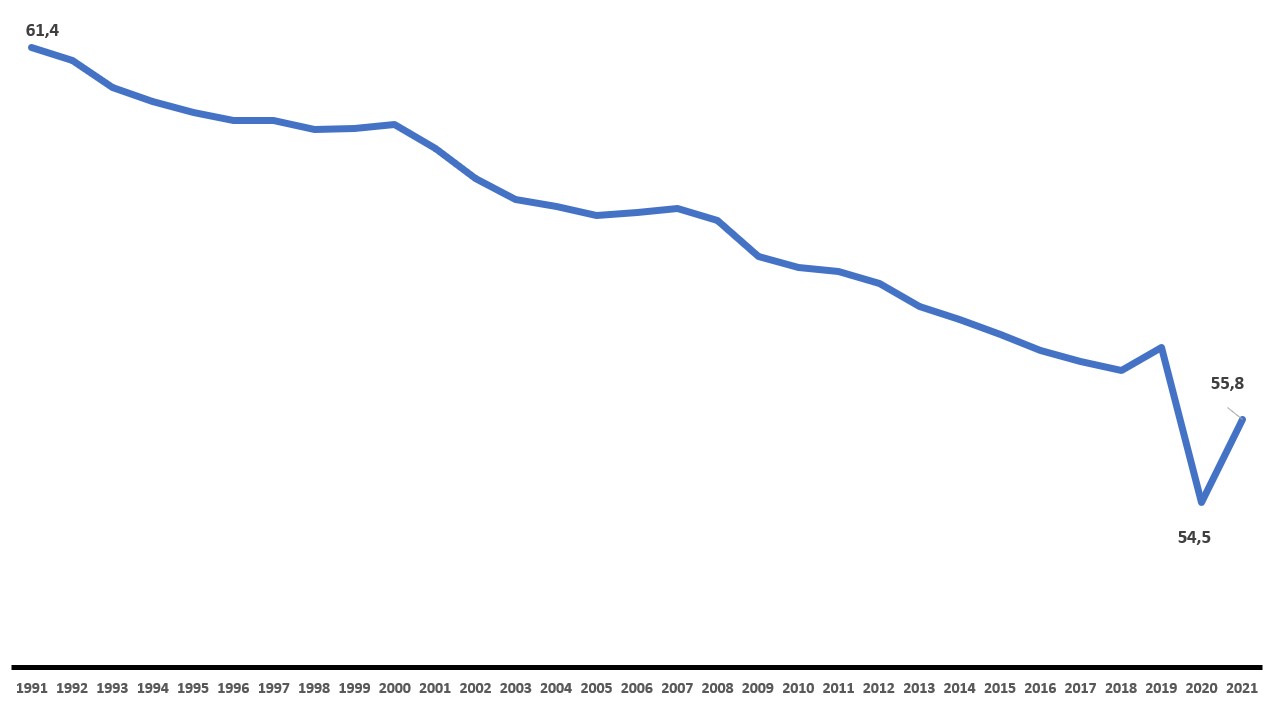An urgent update of the pre-Covid19 forecasts

Vision Think Tank 20231
What will be left of work, the foundational value of societies shaped by the industrial revolutions of past centuries, when – in no more than ten years – Artificial Intelligence will have deployed its first substantial effects? The specter of the last powerful acceleration of the technological revolution we have been experiencing for several decades, must have stirred the celebrations of a holiday – May Day – that celebrates a world that is ending, if it does not radically renew itself.
The fact that the world of work is facing an unprecedented challenge is demonstrated by the fact that the newly formed Trade and Technology Council of the United States and European Union (the US-EU platfrom to coordinate approaches to key global trade, economic and technology issues) devoted one of its first meetings, in December of last year, just one week after the launch of the CHATGPT-3.5 application, to the impact of AI on employment. That document overturned what was believed to be a given until a few months ago, when the impact of the Internet on employment was being discussed.
In a famous study of the Oxford University, that, in 2013, tried to assess - job per job - how susceptibile each occupation was to automatisation, it was believed that routine activities - which process information according to predeterminate pattern as in the call centers - were the one most likely to be questioned, while other jobs seemed to be less replaceable, like the one that involve hands or senses (i.g. cooking), creativity (like advertising) and jobs were phisical or emotional proximity is crucial (as in the case of teachers and students or priests with the faithfuls). In the Oxford study, as in a similar one by McKinsey, in 2014, the amount of job positions that would be exposed to aumatisation was high, but both studies precised that within the same job, there were parts of activities that could be automatised and other that would remain human.
The situation has changed, however, due to two powerful driving forces.
Firstly, the latest generation of AI systems overturns this notion since it is capable of imitating human behaviour. The true nature of machine intelligence, as the inventor of modern computers Alan Turing realized, lies in the ability to imitate human behavior. The ability to understand natural language (in a much more articulate way than Google's digital assistants) exponentially increases the number of problems the machine is called upon to solve, and, thus, the number of problems it learns to solve.
Secondly, this process is further amplified by the convergence with two other technologies. The first is the technology that allowed for the understanding of simple voice commands (as in Siri or Alexa) even before the launch of CHATGPT. This technologies, with the incorporation of neural network techniques, will greatly expand its possibilities. The other is the development of actual robots that will gradually acquire manual capabilities similar to those of humans (who, according to some, have their real, extraordinary competitive advantage in the versatility of their hands), as currently robots are used to move in linear logic (such as in assembly lines, Amazon warehouses, or domestic cleaning robots).
At the end of the process - which will be reasonably completed in no more than ten years, where its notable effects have already begun - real androids will burst into our lives. This androids will be able to imitate humans better and better and to create by making mistakes, but with a power and a speed of calculatation impossiible for us. And this leads the challenge to a different level.
Either manager - especially those who are not used to taking risks - or doctors - also because healthcare tragically needs more efficience - are no longer safe . Talent Garden's report is right when it reminds us that thousands of experts in digital marketing and programming are missing in Italy: the problem is that, if this shortage persists, companies will have a further incentive to replace this figures with robots. It is clear that in a context when even the nature of a company is questioned - where remote work has now become a new right - the same industrial relations patterns are challgend.
There are three anwsers that we need manage to develop.
First of all, we should use the inevitable reduction in the amount of work, that technology progressively induces, in such a way as to free ourselves from the fatigue without increasing inequalities that are already fracturing fragile societies. The phenomenon is not new and employment rates globally have been decreasing for some time (as shown in the Graph below), as well as the number of hours worked per employed person. In 1950, within Europe, the avarage of the hours worked per employed was about 3.000 hours per year, the double of the current amount (more or less 1.500 hours).
As in the past, policies are needed that make use of the increase in productivity that technology enables, as a lever to increase investments in new activities (in the coming years, there is a colossal transformation of production systems to reduce their environmental impact) and to finance a new welfare model capable of responding to new protection demands.
EVOLUTION OF GLOBAL EMPLOYMENT RATE (%; WORLD; NUMBER OF EMPLOYED PEOPLE OVER THE TOTAL WORKING AGE POPULATION)

SOURCE: VISION ON WORLD BANK DATA
Secondly, it will be necessary to invest in the skills necessary to create new jobs. These are the ones in which the machine can never replace the human being. The robot does not think, and merely imitates our cognitive processes. It will never be able to feel emotions and persuade us, even if sometimes it can make us smile. In practice, to save ourselves from progressive technological obsolescence, we will need to invest even more in what makes us human. If we continue to imitate the machines, thinking in a politically correct manner and trying to exclude passions from our lives, we will become useless. Schools, even in Philosophy and Mathematics books, are the ground where the the most important game is played.
Thirdly, in a world where liberation from need becomes much faster, we will need to avoid an excess of unused energy that can, as Keynes intuited, push people to lose their sense of their role and societies to become dangerously lazy. Commitment to volunteering, protecting weaknesses that computers will not make disappear, can be a key to the future.
The biggest mistake we can make, however, is to imagine that we can stop such rapid progress by retreating into the rhetorical defense of a stability that no longer exists. On one hand, it is crucial the European attempt to regulate AI. On the other, however, this attempt could have several drawbacks (on this point, see Vision's paper on AI regulation).
The memory of the struggles that, in another era, served to overcome the unsustainable gap between those who derived enormous profit from machines and those who were crushed by them, must serve to recover intelligence. And that instinct for survival that we seem to have lost in the face of a complexity that we ourselves built.
1: The co-authors of this paper are Giorgia Caianiello and Francesco Grillo from Vision Think Tank. The paper has been an input to a column published by Francesco Grillo in some italian newspapers.
REFERENCES:
2013, Frey C.B, Osborne M., Oxford Martin School, The Future of Employment.
2014, McKinsey and Company, Automation, jobs, and the future of work.
2022, EU-US Joint Statement of the Trade and Technology Council.

